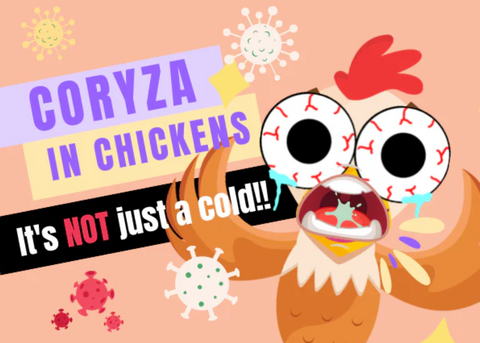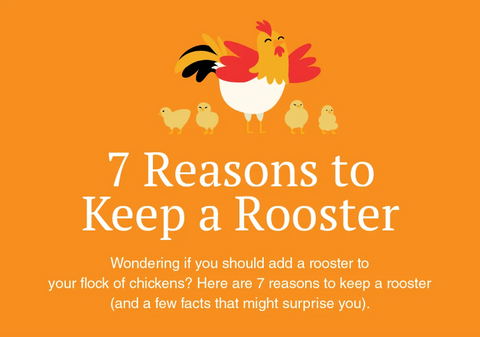🐔 Infectious Coryza in Chickens: Everything You Need to Know (Without Freaking Out… Too Much)
Imagine your flock suddenly sounding like they’ve all caught a cold: sneezing, coughing, snotty beaks, and sad, swollen faces. You’d think it’s just a chicken sniffle, right? Wrong. 😬
Coryza is basically a chicken cold on steroids – highly contagious, hard to get rid of, and sometimes deadly for weaker birds.
But don’t panic! Before you start eyeing your flock nervously, let’s break it down: what Coryza is, how to spot it, how to treat it, and (most importantly) how to stop it before it ever sneaks into your coop.
🤧 What Exactly Is Coryza?
Coryza is caused by a pesky bacteria called Avibacterium paragallinarum.
It attacks the upper respiratory system – which in chicken terms means:
-
🐓 Swollen faces and wattles
-
💦 Snotty nostrils & teary, gunky eyes
-
😷 Wheezy, open-mouth breathing
-
🍳 Fewer eggs in the nest box
-
💤 Lethargy, weight loss, and poor growth in young birds
And here’s the kicker: once infected, a chicken is a carrier for life. Even if they “recover,” they can flare up again or spread it to new flock mates.
🚨 Symptoms of Coryza in Chickens
Your poor chooks might show:
-
Smelly nose & eye discharge (yes… it stinks 🤢)
-
Sneezing & coughing fits
-
Puffy faces, wattles, and eyes
-
Open-mouth breathing struggles
-
Egg laying nosedives
-
Appetite & weight loss
-
Just generally looking miserable and tired
Fun fact (not really fun): roosters often get extra swollen wattles when they’ve got “man-Coryza.”
🦠 How Does Coryza Spread So Fast?
Think of it like the worst office cold ever. One chicken sneezes, and suddenly the whole flock is sick.
-
Airborne droplets (coughs, sneezes, snot rockets)
-
Contaminated feed, water, bedding, or dust
-
Carried on your shoes or clothing from another coop
It only takes 1–3 days for symptoms to show. By the time you notice one sick hen, the rest of your flock is probably already exposed.
🩺 What To Do If You Suspect Coryza
-
Isolate the Sick Chick 🏥 – not to stop spread (it’s probably already too late), but to protect them from bullying while they’re weak.
-
Call the Vet 📞 – antibiotics are needed, and your vet will likely prescribe meds for the whole flock.
-
Tell Your Neighbors 🙈 – awkward, yes. But necessary so they can watch their own birds.
-
Avoid Cross-Contamination 🚫👟 – don’t visit other flocks, and disinfect everything. Coryza loves hitchhiking on shoes and clothing.
👩⚕️ Can Humans Catch Coryza?
Nope! 🙌
Chicken Coryza and the human cold are two totally different bugs. You can’t catch your hen’s germs, and she can’t catch yours.
🍳 Can You Eat Eggs from Chickens with Coryza?
Yes – but only if they’re not on antibiotics. Same goes for the meat. The bacteria isn’t harmful to humans.
🛡️ Preventing Coryza in Your Flock
Here’s how to keep your coop Coryza-free:
-
🧼 Keep It Clean – disinfect coops, feeders, and drinkers regularly.
-
🚪 Biosecurity 101 – don’t wear the same shoes from flock to flock, and wash up.
-
🐥 Quarantine New Birds – at least 2 weeks before introducing them.
-
🐦 Limit Wild Bird Contact – they can carry nasties into your run.
-
🍏 Boost Nutrition – healthy, well-fed chickens fight infections better.
-
🐓 Avoid Poultry Shows – unless you love mingling with every germ out there.
💊 Treating Coryza in Chickens
-
Vet antibiotics are the gold standard. They’ll usually give injections so it works fast.
-
Natural helpers like apple cider vinegar, garlic, oregano, or colloidal silver can support immunity but won’t cure it.
-
Treat the whole flock – because once one chicken is infected, assume they all are.
😢 The Hard Truth About Coryza
-
Chickens may recover but will always remain carriers.
-
You can’t introduce new birds safely.
-
In some cases, keepers have to cull their entire flock to stop the spread.
It’s heartbreaking, but knowing the facts helps you prepare.
🐔 Final Cluck
Coryza is one of those chicken illnesses that sounds like “just a cold” but can wreck your flock fast. The good news? With good coop hygiene, smart biosecurity, and quick action, you can protect your feathered friends.
Healthy chickens = happy keepers. 💛




